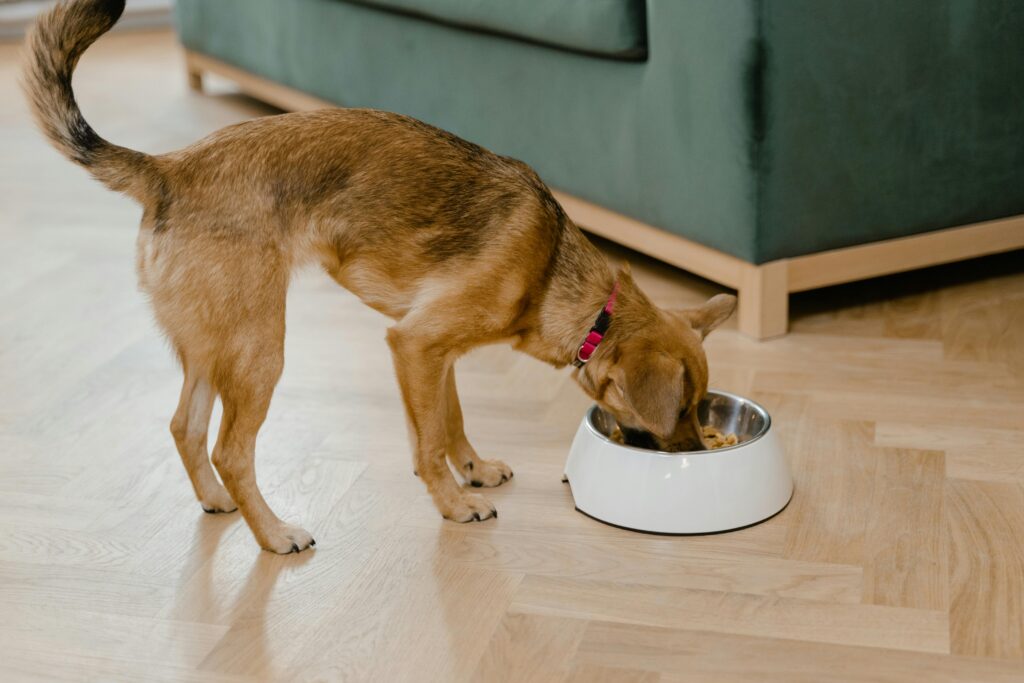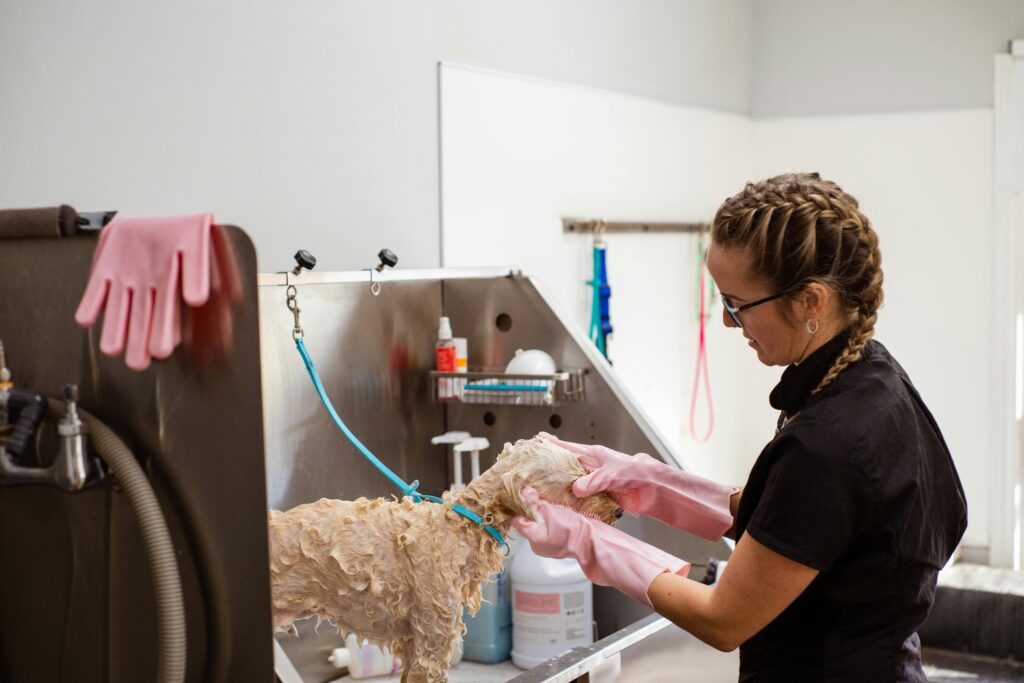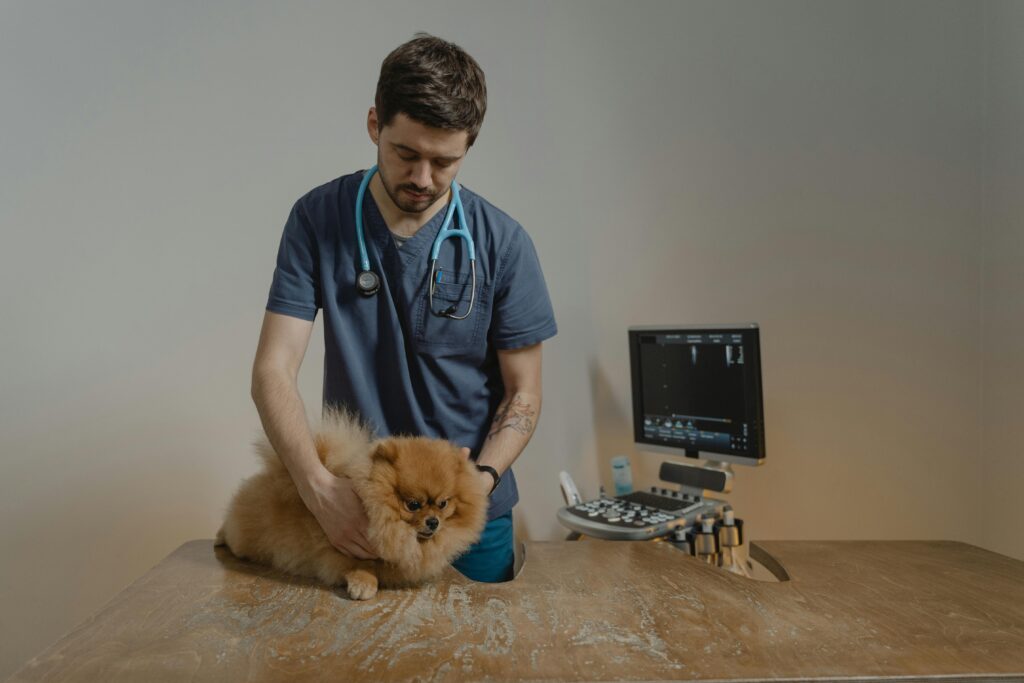It is fun to raise a puppy, but one of the most important things you need to know is what to feed your growing dog every day. To stay healthy, grow big, and be happy, puppies need to eat the right foods. If you give your baby the right food at the right time and in the right amount, it can help their brain, bones, and immune system grow.

Understanding Your Puppy’s Nutritional Needs
Puppies Grow Fast and Need More Nutrients
Puppies need to get enough energy and calories because they grow so fast. To help their bones, muscles, and brain develop, the food they eat should have the right amount of proteins, fats, vitamins, and minerals. If you feed pups regular adult dog food, it might not give them the extra nutrients they need at this point.
Importance of Protein and Fat in Puppy Food
Puppy fat gives them energy to play, learn, and grow, and protein helps build strong muscles. Pet nutritionists say that puppy food should have at least 22% protein and 8% fat. Feathered meats such as chicken, cattle, fish, and lamb are terrific energy sources. Fish oil, chicken fat, and flaxseed oil are all good sources of healthy fats.
Vitamins and Minerals Matter Too
Puppies need more than just protein and fat. They also need calcium for strong bones, DHA for brain growth, and antioxidants to keep their immune system strong. For your dog, look for food that has a lot of minerals and vitamins that come from plants, like A, D, and E. A well balanced meal can help keep you healthy in the future.
Choosing the Best Puppy Food
Dry Kibble for Puppies
A lot of dog owners choose kibble, which is a dry puppy food. It is cheap, easy to store, and cuts down on grit, which helps keep your puppy’s teeth clean. Pick puppy food that is made just for them and has real meat as the first ingredient. Do not eat foods like corn and wheat that have added colors or fillers.
Different Wet Puppy Foods
Young dogs can chew wet food better because it is softer. It also has more water, which helps your puppy stay moist. To give their pets variety, many people mix wet and dry food. Pick wet foods with natural meat, veggies, and healthy oils that do not have extra salt or sugar added.
Grain Free vs. Grain Inclusive Diet
Puppies that do not eat grains may do better, especially if they are allergic to certain foods. On the other hand, many dogs also do well on diets that include grains like brown rice, oats, or barley. Before you move to grain-free food for your dog, you should always talk to your vet first. Some studies have linked grain free diets to heart problems in dogs.
How Much Should You Feed Your Puppy?
Based on age and weight, feed
Your dog’s food needs will change with its age and weight. A small breed puppy might need three to four small meals a day, while a big breed puppy might only need two to three. The daily dry food requirement for a puppy weighing 10 pounds can be 1–1.5 cups, whereas the requirement for a dog weighing 30 pounds might be above 3 cups.
Following the Feeding Guidelines on Packaging
The amount to feed your puppy each day should be indicated on the bag of puppy food according to its weight. Follow those steps at first, then make changes as needed. Please talk to your vet if your baby is getting too fat or seems too thin. Not too fast or too slow; puppies should grow at a steady rate.
Watch Your Puppy’s Appetite and Energy
Each dog is unique. Your dog may be full if they leave food in the bowl. They might need a little more if they are still hungry and licking the bowl clean. To help you figure out the right daily amount for them, keep an eye on their weight, energy level, and the regularity of their stools.
Best Feeding Schedule for Puppies
How Many Times a Day Should You Feed?
Feed your puppy three to four times a day if it is younger than six months. Eating several times a day helps keep your blood sugar level and stomach healthy. Like adult dogs, you can cut back on feeding them to two meals a day as they get bigger.
Meals in the morning, afternoon, and evening
Breakfast should be around 7 to 8 AM, lunch should be around noon, and dinner should be around 5 to 6 PM. This makes it easy to potty train them and helps them get into a routine. Please do not feed your puppy late at night so it has time to eat and go to the bathroom before bed.
Stick to the Same Times Daily
Setting routines by feeding your puppy at the exact times every day is helpful. Routines are great for puppies. This also helps you notice if your puppy skips meals or acts sick, since quick changes in how they eat can be a sign.
Healthy Treats and Snacks for Puppies
Use Treats for Training
You can teach your puppy directions and build good behavior with treats. Keep the treats small and soft so they are easy to chew. Dog treats should not make up more than 10% of their daily food so they do not gain weight.
Picks for Healthy Treats
Small pieces of boiled chicken, baby carrots, blueberries, and natural puppy treats sold in stores are all healthy treats that you can give your dog. Stay away from fatty foods and sweet snacks. Look for treats that say they are safe for puppies and have been approved by vets.
Avoid Unsafe Human Foods
Do not give your dog garlic, chocolate, grapes, onions, or anything spicy. These things are dangerous for puppies and can make them sick. Also, do not give cooked bones because they can break into pieces that can choke or hurt the stomach.
Natural puppy food and meals made at home
Making your dog food
Some puppy owners choose to feed their dogs fresh meat, rice, veggies, and healthy oils that they cook themselves. You are now in charge of what your dog eats. To make sure your puppy gets all the nutrients it needs, you must follow a balanced recipe.
Pros and Cons of Making Your Food
Foods that you make yourself can be healthy and do not have any added chemicals or fillers. They may cost more than store bought food, though, and take longer to make. You should also talk to a vet or pet nutritionist to make sure that your recipe meets all of your puppy’s daily needs.
Putting in natural supplements
Some homemade feeders help the birds grow by adding extras like vitamin powders, fish oil, or bone meal. Before adding something new, you should always talk to your vet first. When it comes to puppies, too much of some vitamins can be bad for them.
Special Diets for Different Puppy Breeds
Small Breed Puppy Needs
Because they burn calories quickly, small breed puppies like Chihuahuas and Yorkies need more calories per pound. Pick food pieces that are small enough for small dogs. These are easier for them to chew and give their busy bodies energy.
What a Large Breed Puppy Needs
Labradors, Great Danes, and other large dogs tend to get joint problems because they grow so quickly. To keep their bones healthy, they need exceptional food made just for big breed puppies that has the right amount of calcium and phosphorus. Please do not feed them too much because growing too quickly can be bad for their health in the long run.
Diets for Hypoallergenic and Sensitive Stomachs
Some dogs are allergic or have stomach problems. Switch your baby to food with fewer ingredients, or that is hypoallergenic, if they have loose stools, itchy skin, or throw up a lot. Look for foods that only have one source of protein and do not have any added chemicals.
Fresh Water Is Just as Important
Always Keep Water Available
Your puppy needs fresh water all the time. Put clean water in a bowl that is not too deep so that your puppy can easily get to it. At least twice a day, change the water to keep it clean and safe.
Water Helps with Digestion
Water is essential for puppies because it helps them digest their food and keeps their organs working properly. Puppies that eat dry food need more water to stay hydrated and avoid having problems going to the bathroom.
A sign that you are thirsty
Keep an eye out for signs like cheeks that feel dry, eyes that look sunken, or a lack of energy. Get in touch with your vet right away if your puppy is not drinking enough or seems weak. When dogs are dehydrated, it can get awful very quickly.
Conclusion
As a pet owner, one of the best things you can do is feed your dog the right food every day. Pay attention to well balanced meals, the right size, and regular eating times. Be careful with treats, give them clean water, and look out for signs of health problems. If you feed your baby well, it will become a strong, healthy, and happy adult dog.



